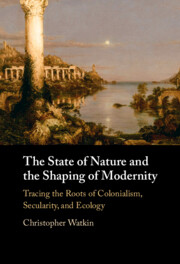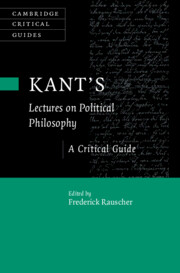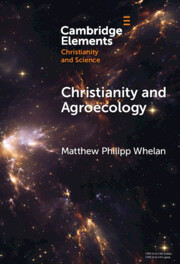Refine search
Actions for selected content:
232 results
18 - Moral Law
- from Part II - Theological Themes
-
-
- Book:
- The Origins of Scholasticism
- Published online:
- 18 November 2025
- Print publication:
- 30 November 2025, pp 495-518
-
- Chapter
- Export citation

The State of Nature and the Shaping of Modernity
- Tracing the Roots of Colonialism, Secularity, and Ecology
-
- Published online:
- 19 November 2025
- Print publication:
- 18 December 2025

The Origins of Scholasticism
- Theology and Philosophy in Paris, 1150–1250
-
- Published online:
- 18 November 2025
- Print publication:
- 31 December 2025
The Creative Role of Virtue in Conscientious Objection: A Thomistic Perspective
-
- Journal:
- New Blackfriars ,
- Published online by Cambridge University Press:
- 18 November 2025, pp. 1-14
-
- Article
- Export citation
The “Crusading Fanatics” of American Law: American Jesuits and the Origins of the Neoscholastic Legal Revival, 1870–1960
-
- Journal:
- Journal of Law and Religion , First View
- Published online by Cambridge University Press:
- 06 November 2025, pp. 1-27
-
- Article
-
- You have access
- Open access
- HTML
- Export citation
Practice, Reason, and the Good: Human Nature and MacIntyrean Business Ethics
-
- Journal:
- Business Ethics Quarterly , First View
- Published online by Cambridge University Press:
- 27 October 2025, pp. 1-29
-
- Article
-
- You have access
- Open access
- HTML
- Export citation
Chapter 7 - Novel Subjects
-
-
- Book:
- British Law and Literature in the Long Eighteenth Century
- Published online:
- 19 September 2025
- Print publication:
- 09 October 2025, pp 147-166
-
- Chapter
- Export citation
Aquinas on Natural Law, Natural Inclinations, and Absolute Moral Norms
-
- Journal:
- New Blackfriars ,
- Published online by Cambridge University Press:
- 11 September 2025, pp. 1-14
-
- Article
- Export citation
Chapter 2 - Leibniz
-
- Book:
- Freedom and Perfection
- Published online:
- 25 July 2025
- Print publication:
- 14 August 2025, pp 29-57
-
- Chapter
- Export citation
6 - Natural Law and Individual Rights
- from Part II - Notions and Practices of Equality
-
- Book:
- Democracy's Double Helix
- Published online:
- 09 September 2025
- Print publication:
- 14 August 2025, pp 151-160
-
- Chapter
- Export citation
Chapter 3 - Receptions of Leibniz
-
- Book:
- Freedom and Perfection
- Published online:
- 25 July 2025
- Print publication:
- 14 August 2025, pp 58-82
-
- Chapter
- Export citation
Chapter 3 - Absorbing Natural Right into the Kantian System
-
-
- Book:
- Kant's Lectures on Political Philosophy
- Published online:
- 18 July 2025
- Print publication:
- 07 August 2025, pp 48-65
-
- Chapter
- Export citation
Chapter 9 - States of Nature as Theories of Normativity
-
-
- Book:
- Kant's Lectures on Political Philosophy
- Published online:
- 18 July 2025
- Print publication:
- 07 August 2025, pp 161-178
-
- Chapter
- Export citation
7 - Reinach on Personality and Representation
- from Part II - Reinach and Private Law Theory
-
-
- Book:
- Reinach and the Foundations of Private Law
- Published online:
- 20 July 2025
- Print publication:
- 07 August 2025, pp 166-188
-
- Chapter
-
- You have access
- Open access
- HTML
- Export citation
Chapter 2 - The Many Ends of Natural Law
-
-
- Book:
- Kant's Lectures on Political Philosophy
- Published online:
- 18 July 2025
- Print publication:
- 07 August 2025, pp 28-47
-
- Chapter
- Export citation
Chapter 1 - A Brief Guide to Achenwall’s Natural Law
-
-
- Book:
- Kant's Lectures on Political Philosophy
- Published online:
- 18 July 2025
- Print publication:
- 07 August 2025, pp 8-27
-
- Chapter
- Export citation

Kant's Lectures on Political Philosophy
- A Critical Guide
-
- Published online:
- 18 July 2025
- Print publication:
- 07 August 2025

Christianity and Agroecology
-
- Published online:
- 17 June 2025
- Print publication:
- 21 August 2025
-
- Element
- Export citation
2 - The Traditional Understanding of Lawmaking by Appellate Courts
-
- Book:
- After the Realist Revolution
- Published online:
- 02 May 2025
- Print publication:
- 22 May 2025, pp 4-10
-
- Chapter
- Export citation
On the Ethics of Lying
-
- Journal:
- New Blackfriars / Volume 106 / Issue 5 / September 2025
- Published online by Cambridge University Press:
- 22 May 2025, pp. 373-397
- Print publication:
- September 2025
-
- Article
-
- You have access
- Open access
- HTML
- Export citation
